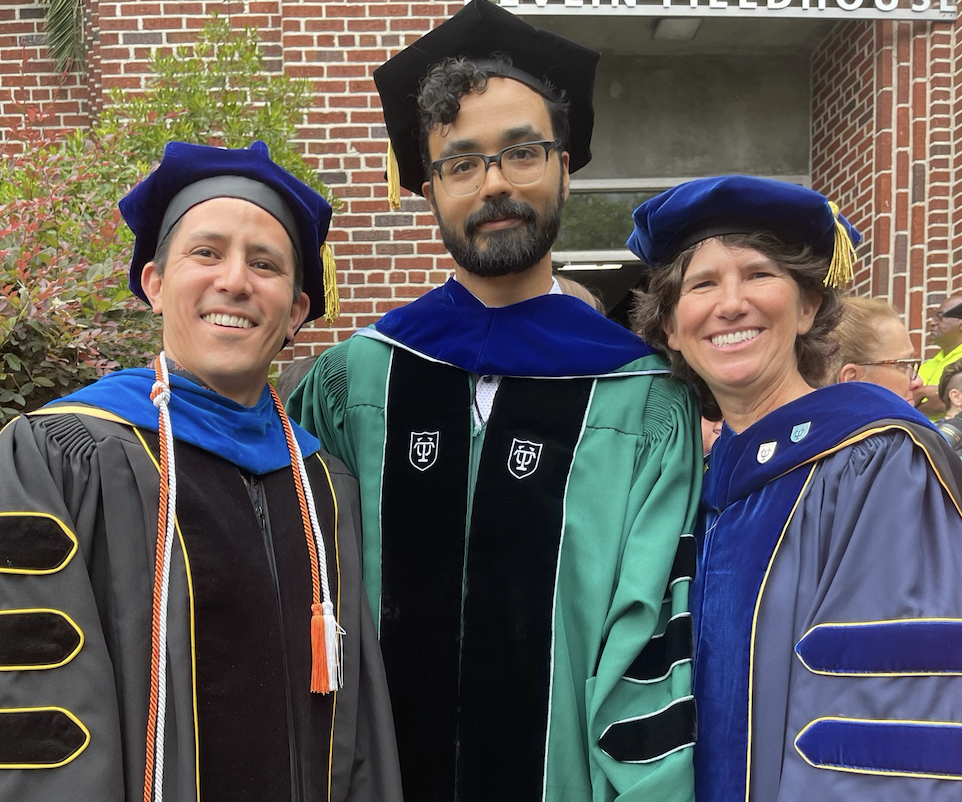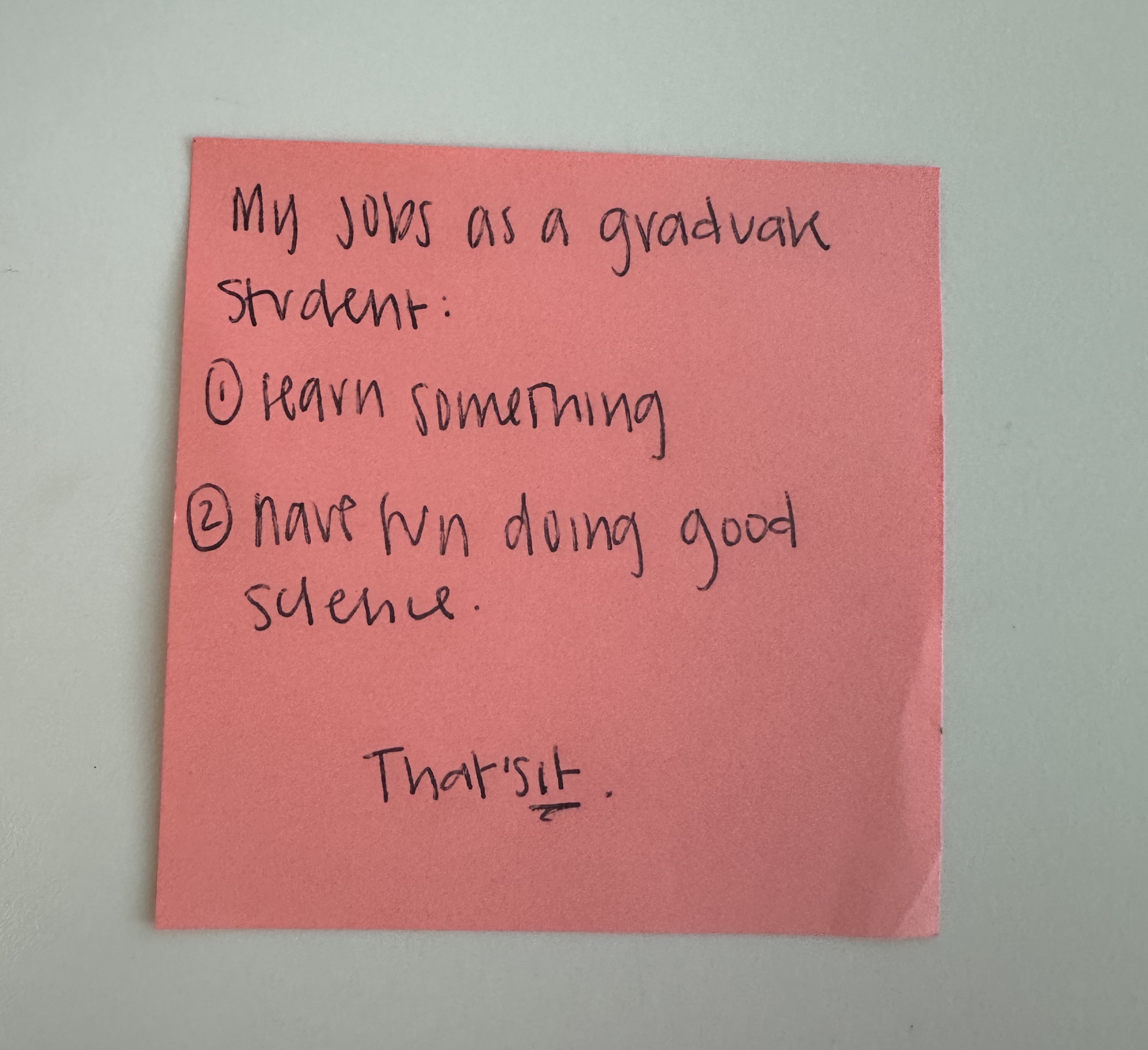Lisa Morici, PhD is building the next generation of “Rockstar” Scientists at Tulane

Pictured from left to right Erin Kuang, Allyson Hirsch, Lisa Morici, Madelyn Kist, and Sofia Santiago Torres.
In a sunlit corner of the Morici Lab at Tulane University Medical School, a pink sticky note stands out with the message: “My job as a graduate student is to (1) learn something and (2) have fun doing good science. That’s it.” This simple yet powerful mantra, given as advice to Allyson Hirsch, a PhD student in Lisa Morici’s lab, reflects the ethos of Lisa Morici, PhD, a microbiologist and immunologist whose impact extends far beyond her own groundbreaking research. At Tulane, Dr. Morici is advancing microbiology and novel vaccine research while cultivating a new generation of innovators in her lab.
A self-described “hands-off” mentor, Morici refers to her team of trainees as “rockstars” and empowers them to live up to the title. Her lab is more than a hub of microbiological discovery—it’s a launchpad for future scientific leaders and entrepreneurs. Morici’s philosophy is straightforward: trust her students, give them autonomy, and be there when it counts. “I don’t have time to micromanage,” she says. “But I’m here when you need me.”
This approach promotes independence, resilience, and critical thinking - all essential for scientific and innovation success. Many PhD students and postdocs in Morici’s lab reported choosing Tulane Medicine for their research due to her strong reputation in the microbiology and vaccine community – both in academia and industry.
Her guidance has also supported the entrepreneurial journeys of two Tulane Innovation Institute teams: Rani Brooks, an Innovation Fellow, and founder of Biophoundry, and Kalen Hall, co-founder of Informuta. Both have participated in numerous TUII programs like Startup Team Mentoring, I-Corps, and Open Medical Innovation Challenge (Open MIC Night).
Brooks and Hall began their research careers in Morici's lab, where they were introduced to other expert faculty members through her extensive connections at Tulane. When Brooks needed expertise in synthetic biology, Morici facilitated a partnership with Nicholas Sandoval, a recognized authority in that field. Similarly, Hall benefited from Morici's introduction to DNA expert Zach Purcell. These initial academic collaborations laid a strong foundation for their startups, which later sought assistance from the Tulane Innovation Institute for further development. "I’m amazed at how the Tulane Innovation Institute has created opportunities for students interested in entrepreneurship and commercialization," Morici noted.
"Working with Lisa was one of the luckiest opportunities of my life. She is one of the most student-focused professors out there, consistently looking for ways to support her trainees. In my case, she provided lab space and some funding to help me start a project unrelated to her research focus. This early support enabled me to secure additional funding, allowing me to develop the preliminary work that has become the core of BioPhoundry. I could not have made it this far without her ongoing encouragement." Brooks said.
Rani Brooks also recalled Morici's altruistic efforts after Hurricane Katrina, when parts of New Orleans were still flooded and without power. She and other members of the Department of Microbiology and Immunology retrieved lab notebooks and documents to ensure that the work of many researchers would not be lost.

Pictured from left to right, Nicholas Sandoval, Rani Brooks and Lisa Morici
Morici is an accomplished scientist known for her ability to inspire young and aspiring researchers. Her current work is supported by the National Institutes of Health and the Department of Defense. She is developing a vaccine utilizing her adjuvant technology aimed at combating whooping cough, which has recently gained national media attention. The vaccine is anticipated to advance to Phase 1 clinical trials soon.
Together with her longtime colleague and best friend, James McLachlan, they are on the brink of a significant public health breakthrough. Both are dedicated to using science to benefit society and were recently honored with the IP Innovator Award at Tulane’s 2024 Research, Scholarship, and Artistic Achievement Awards. This award recognizes faculty members who advance patentable intellectual property with potential for licensing or commercialization.
What sets Morici apart is her holistic approach to mentorship. Beyond providing academic guidance, she fosters community, camaraderie, and well-being in her lab. "We're not just coworkers; we're friends and family," Allyson Hirsch stated, capturing the lab's close-knit culture. From celebrating personal milestones to supporting students through challenges, Morici creates an environment where individuals feel valued and supported.
She is known for helping students build valuable connections outside Tulane, often leading to significant career opportunities. “Lisa consistently connects me with key contacts, always endorsing me enthusiastically and mentioning my upcoming defense. Her introductions—at conferences, mixers, or meetings—have led to several informal job offers.” continued Hirsch. Former researchers frequently remain in touch, seeking her advice long after moving on to prestigious roles in academia and industry.
Her influence extends beyond the professional. "I've attended their weddings and sent baby gifts—these are lifelong connections," Morici shared, reflecting the deep, enduring relationships she maintains with her extended scientific family.
Morici's legacy is much more than academic achievements, published research, and the potential for intellectual property licensing; it is deeply rooted in the careers of the scientists she has mentored. While her guiding principle may be to "do good science," her true brilliance also lies in cultivating the next generation of scientific leaders who are poised to follow in her remarkable “rockstar” footsteps.

